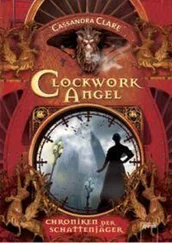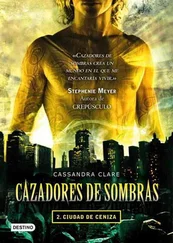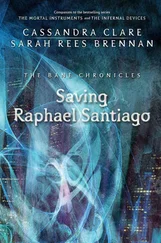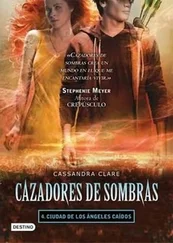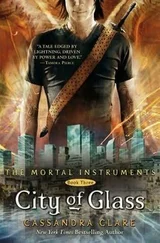Josiah Wayland, Consul of the Clave
Now I will burn you back, I will burn you through,
Though I am damned for it we two will lie
And burn.
—Charlotte Mew, “In Nunhead Cemetery”
It was dark for only moments. The icy water sucked Will down, and then he was falling—he curled in on himself just as the ground rose up to slam into him, knocking the breath from his body.
He choked and rolled over onto his stomach, pulling himself to a kneeling position, his hair and clothes streaming water. He reached for his witchlight, then dropped his hand; he didn’t want to illuminate anything if that might call attention to him. The Night Vision rune would have to do.
It was enough to show him that he was in a rocky cavern. If he looked above him, he could see the swirling waters of the lake, held in abeyance as if by glass, and a blurred bit of moonlight. Tunnels led off the cavern, with no markings to show where they might lead. He rose to his feet and blindly chose the leftmost tunnel, moving carefully ahead into the shadowy darkness.
The tunnels were wide, with smooth floors that showed no mark where the clockwork creatures might have passed. The sides were rough volcanic rock. He remembered climbing Cadair Idris with his father, years ago. There were many legends about the mountain: that it had been a chair for a giant, who had sat upon it and regarded the stars; that King Arthur and his knights slept beneath the hill, waiting for the time when Britain would awake and need them again; that anyone who spent the night on the mountainside would awake a poet or a madman.
If only it was known, Will thought as he turned through the curve of a tunnel and emerged into a larger cave, how strange the truth of the matter was.
The cave was wide, opening out to a greater space at the far end of the room, where a dim light gleamed. Here and there Will caught a silvery glint that he thought was water running in streams down the black walls, but on closer examination it turned out to be veins of crystalline quartz.
Will moved toward the dim light. He found that his heart was beating rapidly inside his chest, and he tried to breathe steadily to quell it. He knew what was speeding his pulse. Tessa. If Mortmain had her, then she was here—close. Somewhere in this honeycomb of tunnels he might find her.
He heard Jem’s voice in his head, as if his parabatai stood at his side, advising him. He had always said that Will rushed toward the end of a mission rather than proceeding in a measured manner, and that one must look at the next step on the path ahead, rather than the mountain in the distance, or one would never reach one’s goal. Will closed his eyes for a moment. He knew that Jem was right, but it was hard to remember, when the goal that he sought was the girl that he loved.
He opened his eyes and moved toward the dim light at the far end of the cavern. The ground beneath him was smooth, without rocks or pebbles, and veined like marble. The light ahead flared up—and Will came to a dead stop, only his years of Shadowhunter training keeping him from tumbling forward to his death.
For the rock floor ended in a sheer drop. He was standing on an outcropping, looking down at a round amphitheater. It was full of automatons. They were silent, unmoving and still, like mechanical toys that had wound down. They were dressed, as those in the village had been, in scraps of military uniforms, lined up one by one, for all the world like life-size lead soldiers.
In the center of the room was a raised stone platform, and on the table lay another automaton, like a corpse on an autopsy table. Its head was bare metal, but there was pale human skin stretched taut over the rest of its body—and on that skin was inked runes.
As he stared, Will recognized them, one after another: Memory, Agility, Speed, Night Vision. They would never work, of course, not on a contraption made of metal and human skin. It might fool Shadowhunters from a distance, but . . .
But what if he used Shadowhunter skin? a voice in Will’s mind whispered. What could he create then? How mad is he, and when will he stop? The thought, and the sight of the runes of Heaven inscribed on such a monstrous creature, twisted Will’s stomach; he jerked away from the edge of the outcropping and stumbled back, fetching up against a cold rock wall, his hands clammy with sweat.
He saw the village again in his mind, the dead bodies in the streets, heard the mechanical hiss of the clockwork demon as it spoke to him:
All these years you have driven us from this world with your runed blades. Now we have bodies that your weapons will not work on, and this world will be ours.
Rage poured through Will like fire in his veins. He tore himself away from the wall and plunged headlong down a narrow tunnel, away from the cavern room. As he went, he thought he heard a sound behind him—a whirring, as if the mechanism of a great watch were starting up—but when he turned, he saw nothing, only the smooth walls of the cave, and the unmoving shadows.
The tunnel he was following narrowed as he walked, until eventually he was squeezing sideways past an outcropping of quartz-laden rock. If it narrowed further, he knew, he would have to turn around and go back to the cavern; the thought made him push himself forward with renewed vigor, and he slid forward, almost falling, as the passage suddenly opened into a wider corridor.
It was almost like a hallway at the Institute, only made all of smoothed stone, with torches at intervals set into metal brackets. Beside each torch was an arched door, also of stone. The first two stood open on empty dark rooms.
Beyond the third door was Tessa.
Will did not see her immediately when he walked into the room. The stone door swung partly shut behind him, but he found that he was not in darkness. There was a flickering light—the dimming flames of a blaze in a stone fireplace at the far end of the room. To his astonishment it was furnished like a room in an inn, with a bed and washstand, rugs on the ground, even curtains on the walls, though they hung over bare stone, not windows.
In front of the fire was a slim shadow, crouched on the ground. Will’s hand went automatically to the hilt of the dagger at his waist—and then the shadow turned, hair slipping over her shoulder, and he saw her face.
Tessa.
His hand fell away from the dagger as his heart lurched inside his chest with an impossible, painful force. He saw her expression change: curiosity, astonishment, disbelief. She rose to her feet, her skirts tumbling around her as she straightened, and he saw her hold her hand out.
“Will?” she said.
It was like a key turning the lock of a door, releasing him; he started forward. There had never been a greater distance than the distance that separated him from Tessa at that moment. It was a large room; at the moment, the distance between London and Cadair Idris seemed nothing to the distance across it. He felt a shudder, as of some sort of resistance, as he crossed the room. He saw Tessa hold out her hand, her mouth shaping words—and then she was in his arms, the breath half-knocked out of both of them as they collided with each other.
She was up on her toes, her arms around his shoulders, whispering his name: “Will, Will, Will —” He buried his face against her neck, where her thick hair curled; she smelled of smoke and violet water. He clutched her even more tightly as her fingers curled against the back of his collar, and they clung together. For just that moment the grief that had clenched him like an iron fist since Jem’s death seemed to relax and he could breathe.
Читать дальше

